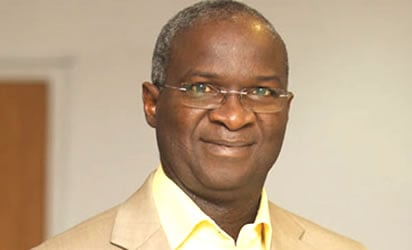Nigeria has one of the fastest growing urban populations in Africa, resulting in accommodation crisis in major cities. Thus, as the country celebrates its 60th independence anniversary, experts score it low in housing provision as over 17 million citizens are without roof over their heads. Dayo Ayeyemi reports.
GOING by the abundant human and natural resources available in the country, Nigerians should have been the most housed in the world. However, 60 years after independence, this is not the situation as the nation still battles with over 17 million housing deficit, which requires about N60 trillion to solve, at the average price of N3.5 million per unit.
According to the United Nations (UN), Nigeria would need to build one million houses per year for the next 20 years to bridge the accommodation gap.
At 60, the nation cannot boast of producing 100,000 units of new houses yearly. Consequently, the housing crisis in Nigeria has pushed majority of low-income group, who couldn’t afford high price tags on limited available accommodation in city centres, to take their destiny in their hands.
Majority of these people live in poorly built makeshifts buildings, ghettos and unplanned informal communities without any basic infrastructure, thereby promoting slums in major urban centres.
The COVID-19 pandemic further revealed the sorry state of housing in Nigeria as the social distancing order could not be implemented in some communities due to high population density.
In the midst of this are thousands of over-priced vacant luxury houses in exclusive neighbourhoods of Ikoyi and Lekki in Lagos as well as Maitama and Asokoro districts of Abuja.
According to experts, Nigeria does not lack housing policies; it only lacks the political will to implement its policy documents.
Reacting to the nation’s parlous state of housing provision, experts decried the unimpressive performance of government in the sector, after 60 years of nation’s independence.
Starting off from 1960 with the first National Development Plan of 1962 – 1968, which was geared towards the establishment of state owned housing corporation, to the second National Development Plan from 1970 to 1974 that saw to the establishment of National Council on Housing and the creation of Federal Housing Authority and the establishment of National Housing Program to construct about 59,000 housing projects, former Managing Director of FHA, Terver Gemade, remarked that the nation has come a long way in terms of policies.
According to him, the third National Development Plan from 1975 to 1980 saw activities of the Federal Government’s direct intervention in housing. He recalled that about 220,000 dwelling units were proposed-50,000 units in Lagos and 8,000 units in each of the then 19 states, adding that by the end, only 15 per cent of the projection was achieved.
He recalled that the Nigeria Building Society was also converted to Federal Mortgage Bank of Nigeria (FMBN) in 1976 with a special capital base of just about 20 million and then increased to about 150 million later in 1979.
“Then, there was the elaborate national housing program of 1979 to 1983 and 1994 to 1996. The government white paper of 2002 recommended the implementation of programs of constructing about 40,000 housing units per annum nationwide, with at least 1,000 units in each state. That again was left in policy and not in practice,” he said.
Pains
Gemade blamed failure of Nigeria’s housing policies on policy summersaults, short tenures and the lack of political will to continue ongoing projects and policies by successive regimes.
Some of the challenges affecting the delivery of mass affordable housing for Nigerians, Nigeria Tribune gathered that they were not limited to harsh operating business climate, but included polity instability, high cost of funds, high cost of building materials, lack of virile secondary mortgage bank, foreclosure law, high cost of land, low-income nature of people, ignorance, documentation issue, corruption, bottlenecks procedures associated with building permit/approval and high cost of securing certificates of occupancy, among others.
Although, the country also has recorded some positives by initiating reforms that led to the construction of housing estates in many state capitals and Abuja, creation of Real Estate Developers Association of Nigeria (REDAN), Building Materials and Manufacturers and Producers Association of Nigeria (BUMPAN), Nigerian Mortgage Refinance Company (NMRC), a second secondary mortgage institution and implementation of Modern Mortgage Foreclosure Law by some states for seamless mortgage transactions, findings revealed that some housing and mortgage-related bills are still pending before the National Assembly.
It is the expectation of stakeholders that if these bills are eventually passed into laws, they would impact positively on the sector by guaranteeing huge local and foreign investments in the housing and mortgage industries.
Pending bills
Pending bills include the Land Use Act 1978; Mortgage Banks Act 1989 (Subsumed in BOFIA); Federal Mortgage Bank of Nigeria (FMBN) Act 1993; NHF Act, the Trustees Investment Act 1962 and the Nigeria Social Insurance Trust Fund (NSITF) Act 1993.
The National Housing Fund (NHF) Scheme Act 1992 was actually amended, passed and sent to the President for assent, but it was declined after the realisation that the bill was defective and put together without a wide consultation and input from all relevant stakeholders.
Others are the Insurance Act 2002; Investment and Securities Act 1999; Federal Housing Authority (FHA) Act 1990; Securitisation Bill; Foreclosure Law Bills – Residential Mortgage Act and Residential Mortgages (Incentives) Act, among others.
According to the President, Housing Development Advocacy Network (HDAN), Mr Festus Adebayo, no effective mortgage system would be possible in the housing sector without reviewing and amending some sections of the Land Use Act of 1978.
Former Managing Director, Lagos State Property Development Corporation, John Bede Anthonio, an architect, said that non-passage of these bills had greatly impeded the development of mortgage and housing for the average Nigerian.
He said that it would be difficult to attract investments into housing and mortgage sectors without proper regulations. Anthonio said “If you don’t have laws to govern, how can investors invest in the housing market?”
Chairman, HOB Estates Limited, Olusegun Bamgbade, stated that apart from inadequate funding, which he said was a major factor, nepotism in the disbursements of the little available funds by the relevant authorities, has stalled recovery of the sector from slump.
Professor of Urban and Regional Planning, University of Lagos, Leke Oduwaye, called for an urgent review of the Land Use law in Nigeria so that people would easily have access to land on which they can build houses.
Commenting on Nigeria’s performance in the Housing Sector as the country turns 60, Professor of Estate Management, University of Lagos, Olugbenga Nubi, said the nation’s mortgage industry has not developed, saying there was nothing to show for it.
According to him, the contribution of mortgage to the Gross Domestic Product (GDP) still remained less than five per cent, compared to 40 to 80 per cent in countries like the United States of America and United Kingdom.
“All over the world, developers build houses and you buy from them, and not that you will begin to build one house for 15 years.
“We must change this. In other parts of the world, once you show evidence of income, either poor or rich, you buy your house. It’s only here that you will see poor man that wants to build a house. This is what is obtainable in the country today.”
The housing finance and urban regeneration expert noted that the story of Nigerian mortgage and housing sectors has not changed from the past, saying government, policy makers and stakeholders have refused to understand the working of the housing system.
“We failed to understand that there is a system that starts from land acquisition to mortgage, to secondary mortgage. We continue to see housing as brick and mortar, but housing is a commodity product that we must provide in large quantity, where people can buy in large quantity,” he said.
According to the professor, residential housing alone constitutes 48 per cent of the American wealth, while stock took the remaining.
President, Nigerian Institution of Estate Surveyors and Valuers (NIESV), Mr Emma Okas Wike, stated the nation has not done much, noting that it has to invest more in real estate.
According to him, government should partner the private sector by providing necessary infrastructure for investors to provide houses.
“Government should not be involved in building houses. Houses should be seen as investment,” he said.
He urged the need to talk about structure and processes of housing, pointing out that without major amendment to the Land Use Act, it would be difficult for people to invest in housing sector.
“Most of the available land is not registered, and as a result, cannot be used for financial transactions. Without security, it becomes difficult for financial institutions to transact business.”
The NIESV boss suggested that the mortgage system should be reworked to give room for long-term housing loans.
Rural housing
Former Director-General/Chief Executive Officer, Nigerian Building and Road Research Institute (NBRRI), Professor Danladi S. Matawal, an engineer, said it was unfortunate that the housing sector’s discussions made meaning only with reference to the urban landscape in the country because the rural areas have been abandoned.
He pointed out that unless this attitude is reversed, a bright future would continue to be doubtful for sustainable housing and development in the country.
“If over 70 per cent of Nigerian citizens traveling to Abuja expect to remain as a resident of the capital city because of the lowest standard of living in the rural areas, then it spells a bleak future for Nigeria,” he said, adding that similar scenarios could be painted for almost all the state capitals in the country and definitely very grievous situations for Lagos, Africa’s most populous city.
For the country to ensure effectiveness and sustainability in housing, the professor of civil engineering stated that policy has to focus on providing comfortable and affordable housing for rural dwellers, clean up and transform urban slums into attractive dwelling space with good homes and network of roads, acceptable hygiene and sanitation set ups via good liquid and solid effluent treatment and disposal.
He said the influence of quantum demography has to be factored into housing and all economic and development equations in the country, noting that the huge population growth of Nigeria has outpaced and neutralised the mitigation effects of any meaningful policy in the country.
Going forward, he urged government to possibly institute some population control measures so that attempts at reducing housing deficit could be effective.
Experts’ views
Another expert, Mallam Ali Mohammed Magashi, called on stakeholders in the housing sector to form a synergy towards accelerating the provision of housing for Nigerians.
He called on the Federal Government of Nigeria to be more committed to the housing sector which he described as the largest contributor to the Gross Domestic Product, stating that unimpressive result has been achieved so far in the sector.
Managing Director of the Family Homes Fund, Mr Femi Adewole, whose mandate is to use housing to improve the living standards of Nigerians on low income by building quality homes, providing home ownership financing solutions and creating jobs through the process, enjoined the government to put up robust programs towards bettering the housing sector in the coming 60 years.
According to him, outlining the achievements of the Nigeria’s housing sector at this point would be quite ‘difficult’ because the expectations of the majority of Nigerians are yet to be met even though the country has come a long way and has done fairly well by starting from the scratch and has now etched its position clearly in the comity of nations.
“But we must now go on from the past into the future and dedicate the next 60 years to a massive housing programme. What I see in the next 60 years are cities that are modern, cities that are sustainable, cities that are green,” he said.
Managing Director of the Federal Mortgage Bank of Nigeria, Ahmed Dangiwa, called on the stakeholders of the housing sector to work in synergy with the government towards the provision of affordable housing for Nigerians, describing housing as a major contributor to the nation’s economy.
The managing director of the apex mortgage institution said the sector is still an emerging market and a reflection of the nation’s economic development.
He revealed that the country was running on housing deficit against what it had guaranteed and that government as well as the private sector would need to come on board to do more.
According to him, government has to come on-board to do more by allowing more private establishments to partner with the FMBN in providing houses for the citizens.
According to him, government institutions should also review and amend obsolete laws in order to improve access to land and mortgages; stating that the Land Use Act, which has been in use since 1970’s is yet to be reviewed and amended.
YOU SHOULD NOT MISS THESE HEADLINES FROM NIGERIAN TRIBUNE
COVID-19: Nigeria’s Deaths Last Week Lowest In Five Months
Last week’s record of seven COVID-19 deaths is Nigeria’s lowest in five months, Tribune Online analysis shows.
According to data sourced from the Nigeria Centre for Disease Control (NCDC), the last time Nigeria recorded fewer weekly deaths was the nine deaths recorded between April 12 and 18.
Labour Suspends Today’s Strike
THE organised labour in the early hours of Monday announced a suspension of its strike slated to start today over prices of fuel and electricity.
The suspension of the strike action was contained in a communique it signed with representatives of government.
CROSSFIRE: Don’t Join Proposed Strike By Labour, FG Warns Civil Servants
The Federal Government has warned civil servants not to obey the call for industrial action by labour unions.
CROSSFIRE: No Going Back On Nationwide Strike — Labour
DESPITE court restriction, the total shutdown of government offices and all business activities is imminent as the industrial strike and a nationwide protest declared by the organised labour over the increase in the prices of fuel and electricity tariff commences early Monday morning.






